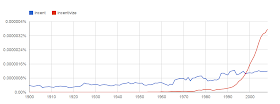Please, please, please, stop using "incentivize." This is an unnecessary expansion of the perfectly good verb "incent."Of course, both incentivize and incent have been widely denounced as business jargon in recent years. When I polled Boston Globe readers on their distaste for "new" and controversial verbs, incent/incentivize ranked second (after dialogue). So naturally, another Times reader soon posted a terse response:
"incent" is not a word.Of course it is a word, like it or not. But more than that, the first commenter is correct on the history: Incent was in print, according to the online Oxford English Dictionary, as early as 1844, in a New York weekly. An expanded version of the citation:
She had been dazzled by the supposed wealth of a gay fellow, and, incented by the stupid ambition of an ignorant mother, she thought that the purse of the one was far superior to the heart of the other.
Yes, this is an American source, but incent didn't remain American: By the end of the century, it was appearing in British texts as well. It didn't make much headway, though, over the decades; as the Google Ngram graph shows, it's the newer incentivize that really caught on. (Attempts to split the difference with incentize have flopped.)

We like to think of those -ize verbs as horrible modern business jargon, but in fact, as Merriam-Webster's Dictionary of English Usage notes, they've been catching flak for over 400 years. Some die off (pulpitize, melancholize); some stick around (economize, legalize) and make themselves useful. In any case, it's their novelty, not their -ize endings, that rubs people the wrong way. Despisers of -ize should breathe deeply and recall that one of our oldest -ize verbs, respectably rooted in Latin and Greek, is the 13th-century baptize.

We like to think of those -ize verbs as horrible modern business jargon, but in fact, as Merriam-Webster's Dictionary of English Usage notes, they've been catching flak for over 400 years. Some die off (pulpitize, melancholize); some stick around (economize, legalize) and make themselves useful. In any case, it's their novelty, not their -ize endings, that rubs people the wrong way. Despisers of -ize should breathe deeply and recall that one of our oldest -ize verbs, respectably rooted in Latin and Greek, is the 13th-century baptize.
I agree with the Times reader that "incent" is not a word of English.
ReplyDeleteI looked up "-ize" on line and found in the Merriam Webster dictionary:
Usage Discussion of -IZE
The suffix -ize has been productive in English since the time of Thomas Nashe (1567–1601), who claimed credit for introducing it into English to remedy the surplus of monosyllabic words. Almost any noun or adjective can be made into a verb by adding -ize ...
which at first seemed reasonable to me until I tried some test cases to see if it was true. Just take a few nouns and adjectives and add -ize. See if you get a real word of English. It hardly ever works.
Why do people say stuff like this and why doesn't anyone catch them at it?
Greg, when whoever it was at Merriam-Webster wrote "Almost any noun or adjective can be made into a verb by adding -ize ...", I don't believe they were asserting (a) that as soon as one coins a new word in that way then it retroactively turns out to always have been a word before, or (b) that the first time someone utters such a new combination that makes it a word even if nobody else ever uses it. If you ask me what I think they were asserting, well, the more I examine it the less content that weaker statement seems to have.
ReplyDeleteWhat they mean, I believe, is that if you say "Let's yellowize that house" anyone who hears you will *know what you mean* by the verb.
ReplyDeleteThis is not to say that the new verb is good, acceptable, pretty, needed, or anything else, of course.
Ridger: Yes, in some cases anyone will know what you mean, but in other cases they might easily guess wrong. Winterizing a house could have meant installing air conditioning. Womanizing could have referred to a sex-change operation.
ReplyDeleteIt would be good to distinguish transparency from productivity. Verbs with -ize are not all perfectly transparent, so for example taking one of Jan's examples, baptize doesn't mean cause to be bapt, as one might have thought. All the same, many, many -ize forms are transparent.
ReplyDeleteProductivity is something quite different. A suffix is productive when you can correctly predict when you'll get a word by appending the suffix and what the suffixed form will mean. Generally, inflectional suffixes are pretty productive, but derivational suffixes are not very productive. <-ize> is a derivational suffix (it changes the part of speech), and so it is no great surprise that it turns out to be unproductive.
What was surprising to me was not so much that the M-W discussion was mistaken about this, but nobody thought to checked it out. It's really easy to check the productivity of -ize. Take any random paragraph, add -ize to each noun and verb, and see whether you come up with English words.
Looking just above at empty's posting, I get: *Ridgerize, *casesize, *anyoneize, *whatize, *youize, *otherize, *theyize, *wrongize, *housize, *airize, *conditioningize, ...
@Gregory Lee
ReplyDeletePutting aside exactly what you mean by "real word of English", I've briefly tested the concept for myself. To my ear it doesn't work at all for single syllable words, but the method lexicalizes polysyllabic roots well enough, with the caveat that some of the results do seem contrived, especially if the noun or adjective was formed from a verb in the first place. Ie. bake-baker-bakerize or apparently incent-incentive-incentivize.